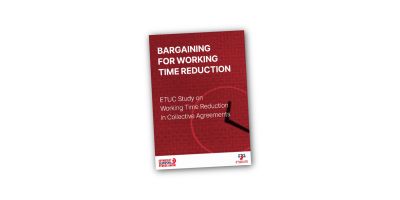A new study by the European Trade Union Confederation (ETUC) shows that reducing working time through collective bargaining is a powerful tool to tackle burnout, improve work-life balance, and address labour market challenges – all without reducing pay or productivity.
The study, titled Bargaining for Working Time Reduction, analyses 119 collective agreements from across Europe and finds that shorter working hours are already being won by unions in sectors ranging from healthcare and manufacturing to public services and finance.
The agreements are delivering real benefits: improved mental and physical health, higher job satisfaction, better staff retention, and increased productivity. In some cases, such as in Germany and Italy, working time reduction is also being used to support job security during the green and digital transitions.
The study, launched today at a joint ETUC-FES event (follow the launch event live here from 14:00 CEST) also highlights how working time reduction can help address gender inequality, support disabled workers and carers, and contribute to climate goals by reducing commuting and energy use.
While the study is aimed at trade union negotiators, its findings are a call to action for employers and policymakers to support collective bargaining as the most effective route to a fairer, more sustainable world of work.
Sine the industrial revolution, trade unions have been leading the struggle to achieve historical milestones such as the 5-day workweek and the 8-hour workday. By organising in trade unions, workers are reclaiming their fair share for a better work-life balance.
Deputy General Secretary Isabelle Schömann, said:
“This study proves what trade unions have long known: reducing working time is good for workers, good for employers, and good for society.”
“Too many workers are burning out while others can’t get enough hours to make ends meet. Working time reduction is a smart way to share work more fairly, improve wellbeing, and make jobs more attractive – especially in sectors facing labour shortages.”
Confederal Secretary Tea Jarc, said:
“This is not a utopian dream – it’s already happening. Unions are showing that with strong organisation and smart negotiation, we can win back time for workers and build a more sustainable and inclusive economy.”
“We need a working time revolution. Let’s make shorter working hours the new normal – for healthier workers, stronger unions, and a fairer society.”
ENDS
Notes:
The study was produced with support from the European Commission and includes contributions from trade unions in 29 European countries.

